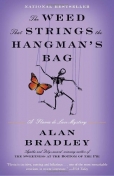BKMT READING GUIDES
The Weed That Strings the Hangman's Bag: A Flavia de Luce Novel
by Alan Bradley
Paperback : 400 pages
3 clubs reading this now
3 members have read this book
Introduction
Flavia de Luce, a dangerously smart eleven-year-old with a passion for chemistry and a genius for solving murders, thinks that her days of crime-solving in the bucolic English hamlet of Bishop’s Lacey are over—until beloved puppeteer Rupert Porson has his own strings sizzled in an unfortunate rendezvous with electricity. But who’d do such a thing, and why? Does the madwoman who lives in Gibbet Wood know more than she’s letting on? What about Porson’s charming but erratic assistant? All clues point toward a suspicious death years earlier and a case the local constables can’t solve—without Flavia’s help. But in getting so close to who’s secretly pulling the strings of this dance of death, has our precocious heroine finally gotten in way over her head?
Editorial Review
Amazon Exclusive: An Essay by Alan Bradley 
Flavia de Luce walked into my life one winter day, parked herself on a campstool, and refused to be budged.
It took me quite a while to realize that she wasn’t even faintly interested in the mystery novel I was attempting to write at the time: the one into which she had wandered. I found out quickly enough that Flavia wanted her own book--and that was that.
And it was just the beginning. There were still more problems to come.
The first was this: Flavia lived in 1950, while I was writing about her in 2006 and 2007.
As an author, it’s not as easy as you might think projecting--and keeping--your mind in a different century from your body--not without forever being yanked back into the present by everyday annoyances such as frozen water pipes, expiring license plates, incessantly barking dogs, and the need to shop for food.
Another problem was this: I lived on Canada’s west coast, where the clocks are set to Pacific Time, while Flavia lived in Bishop’s Lacey, England, which is on Greenwich Mean Time--a difference of nine hours. In practical terms, this meant that Flavia was raring to go every day just as I was getting ready for bed. Because there was no point in either of us being tired and cranky, we finally managed to work out a compromise in which I began awakening at 4:00 a.m. to write, while Flavia (rather impatiently) hung around until after lunch, waiting for me to show up.
As The Sweetness at the Bottom of the Pie progressed, I soon learned that Flavia wouldn’t be pushed around--especially by me. Because she had so many of her own ideas, she had little patience with mine. Occasionally, if I were tired, I’d find myself trying to put words in her mouth: to push her, as it were. But Flavia would have none of it.
"Blot that," she seemed to be saying. "Let’s back up and start again."
And of course we did.
Then there was the problem of the chemistry. While Flavia knew everything about chemistry that could be known, my own knowledge of the subject could be put into a thimble with room left over for a finger. If I protested that I was in doubt about the precise details of one of her more bizarre chemical experiments, Flavia would snap her metaphorical fingers and say, "Well, you can look it up in your spare time."
Almost from the outset I realized that the tale Flavia had to tell could never be contained in a single book. And that’s how the series was born. Fortunately, my editors were in total agreement!
We liked the idea of each book revolving around some now-vanished English custom, or way of life, and of being able, gradually, to get to know the de Luce family, giving each of them the time and the space to--eventually--tell his or her own story.
Of course, to convey authentic 1950s voices, the pacing would have to be slower than we are used to in the 21st century. On the other hand, a more relaxed narrative would allow for an additional overall richness of description that might not be found in a more breakneck series of thrillers.
But I needn’t have worried: Flavia had her own voice and insisted on being listened to.
It was I who had to do the learning. --Alan Bradley
(Photo © Shirley Bradley)
Discussion Questions
No discussion questions at this time.Book Club Recommendations
Recommended to book clubs by 1 of 1 members.
Book Club HQ to over 90,000+ book clubs and ready to welcome yours.
Get free weekly updates on top club picks, book giveaways, author events and more








